Electromagnetism
1/60
There's no tags or description
Looks like no tags are added yet.
Name | Mastery | Learn | Test | Matching | Spaced |
|---|
No study sessions yet.
61 Terms
what is generated by current flowing through a wire?
a magnetic fieldw
what is the direction of the magnetic field around a straight current-carrying wire given by?
Right Hand Rule
what pattern does the magnetic field make around a current-carrying wire?
concentric circles with the wire in the centre
what does the magnetic field around a flat circular coil of current-carrying wire look like?
concentric ellipses around the coil, direction given by RHR
what is a solenoid?
a coil of wire
what is the magnetic field inside of a solenoid like?
uniform (straight equally spaced lines through) and strong
what is a uniform magnetic field?
a magnetic field made up of straight, equally spaced lines from North to South
what is the magnetic field like outside of a solenoid?
like that of a bar magnet
what do the ends of a solenoid act like and what does this mean?
they act like the North and South pole of a bar magnet, it means it’s called an electromagnet
how can you increase the strength of a solenoid?
adding more turns to the coil in the same distance
increase the current flowing through the coil
add a soft metal rod (iron) to the centre
what happens if a wire is placed in a magnetic field?
it moves
why does a wire move if placed in a magnetic field?
it experiences a force because the two magnetic fields (wire and magnets) interact with each other, and thus the charged particles in the wire experience a force
what direction does the wire have to be to the magnetic field to experience the full force?
perpendicular (anything less experiences a lesser force)
what happens if the wire is parallel to the magnetic field?
no force is experienced
how would you increase the force applied to a wire when in a magnetic field?
increase the strength of the magnetic field
increase the amount of current passing through the wire
how would you change the direction of the force applied to a wire in a magnetic field?
reverse direction of the magnetic field
reverse the direction of the current
which rule explains the way that a force will act on a wire in a magnetic field?
Fleming’s Left Hand Rule
what do each of the three fingers in FLHR stand for?
Thumb - F - Force
1st Finger - B - Magnetic Field Direction
2nd Finger - I - Current
what type of current does the motor effect rely on?
D.C.
what is the setup of a DC electric motor?
a coil of wire is placed between two N+S magnets
a split ring commutator is placed at the positive and negative ends of the coil
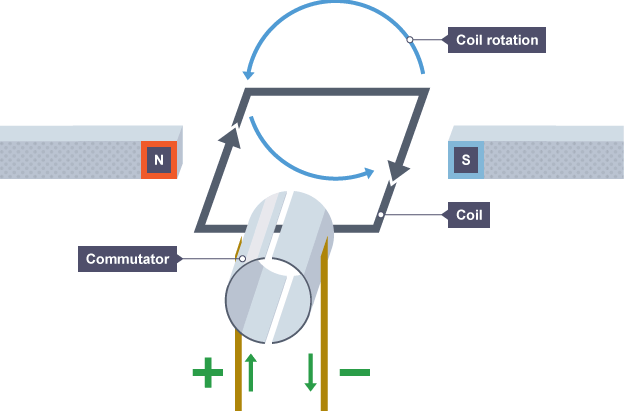
how does a D.C. motor work?
a current flows through the coil which causes forces to act on it
at one point the current flows away from the battery and at another towards
this means that opposite forces act on each side (LR) of the coil
this causes the coil to rotate
what does the split ring commutator do?
the split ring commutator swaps the contacts (coils’ positive and negative terminals) each half turn so the motor rotates in the same direction
what would happen if there was no split ring commutator?
the coil would keep flipping back and forth
what should happen when the coil has turned 90 degrees?
it should stop turning as the coil is now parallel to the magnetic field lines
what actually happens when the coil turns 90 degrees?
the momentum keeps the coil turning
how do you increase the speed of a motor?
adding more turns to the coil
increasing the strength of the magnetic field
adding a soft iron core
how do you reverse the direction of the motor?
reversing the polarity of the D.C. supply
swapping the magnetic poles over
what kind of current do loudspeakers use?
A.C.
describe the set up of a loudspeaker
a coil of wire is wrapped around the base of a cone
this is surrounded by a permanent magnet
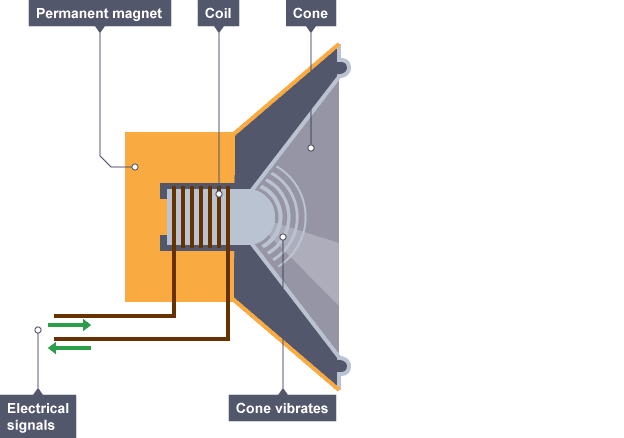
how does a loudspeaker work?
a current flows through the coil creating an electromagnetic field
this interacts with the magnetic field of the magnet generating a force
this pushes the cone outwards
the current flows in the opposite direction
the direction of the electromagnetic field reverses producing an opposite force
this causes the cone to be pulled back inwards
repeatedly alternating current forces vibrations to be produced, causing sound waves in air
what is electromagnetic induction?
the creation of a voltage in a wire which is experiencing a change in magnetic field
what are the two different ways you can induce a voltage?
an electrical conductor (wire) is moved through a magnetic field
the magnetic field through an electrical conductor changes (size or direction)
how can you induce a current?
you can induce a current if a voltage is induced in a complete circuit
how can you reverse the direction of an induced voltage?
reverse the direction of movement
reverse the polarity of the magnetic field
how do you increase the strength of an induced voltage?
increase the strength of the magnet
increase the number of turns on the coil
increase the speed of movement
what type of current does a generator induce?
A.C.
what aspect of electromagnetism does a generator use?
electromagnetic induction
how is a generator set up?
a circular coil of wire is set up between two magnets (NS), and there are slip rings and brushes at the terminals of the wire
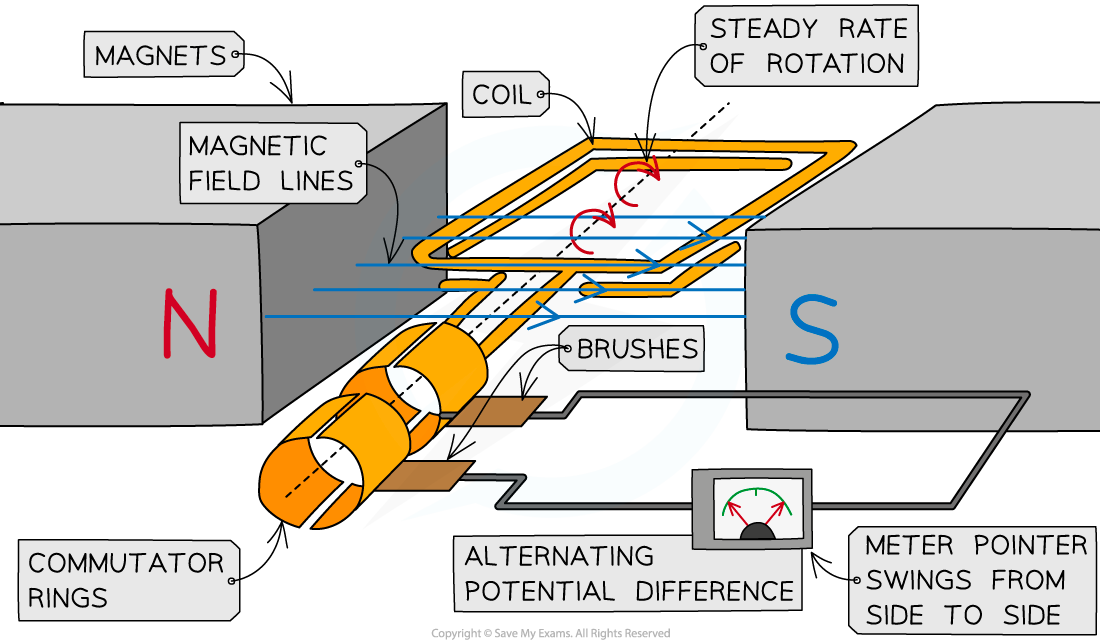
how does a generator work?
a force is applied to make a coil of wire rotate between two magnets
as the coil rotates it cuts the magnetic field meaning it experiences a changing magnetic field
this induces a voltage in the coil
this induces a current as it is a complete circuit - the current changes direction every half turn
what is the function of the slip rings and brushes?
to prevent the contacts/terminals changing every half turn
what can be used to represent the voltage induced by a generator?
a voltage (y) -time (x) graph
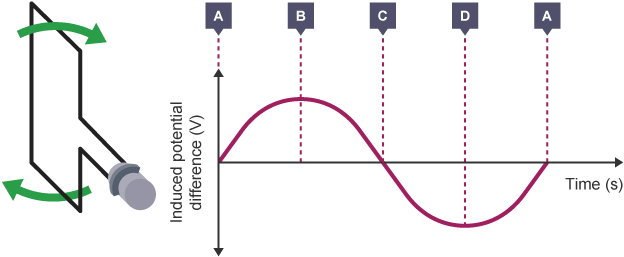
what does point A represent on the graph?
the coil is vertical/at 0/360 degrees, so it is moving parallel to the direction of the magnetic field and no voltage is induced
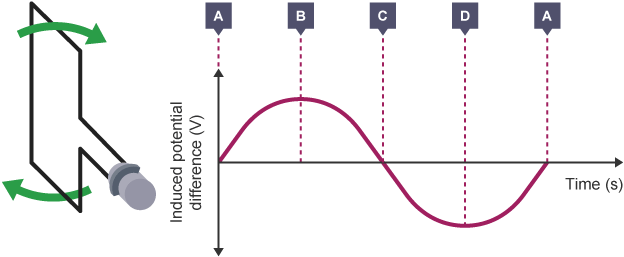
what does point B represent on the graph?
the coil is at 90 degrees, and 90 degrees (horizontal) to the magnetic field, so the maximum voltage is induced
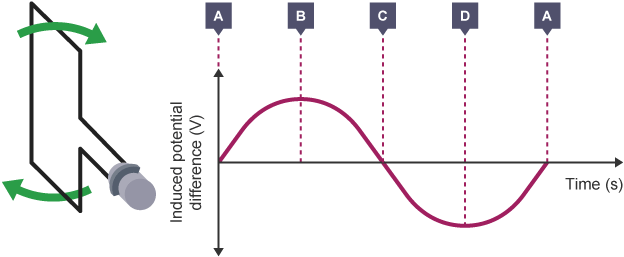
what does point C represent on the graph?
the coil is at 180 degrees/vertical, so it is moving parallel to the direction of the magnetic field so no voltage is induced
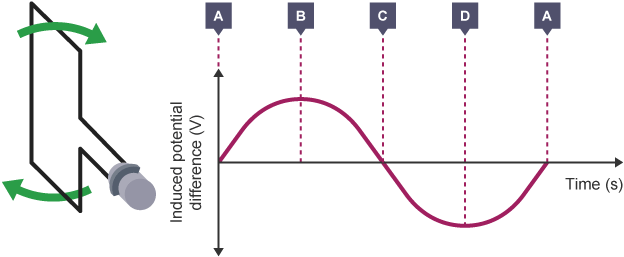
what does point D on the graph represent?
the coil is at 270 degrees, and 90 degrees (horizontal) to the magnetic field, so the maximum voltage is induced - this is opposite to B - here it is negative
how would turning the coil faster (faster revolutions) change the shape of the graph?
there would be more, higher peaks
this means that the current alternates more and the voltage is greater
what are generators used for?
they are used by power stations to produce electricity
what type of current do transformers use?
A.C.
what do transformers do?
they change the size of a voltage
what components does a transformer have?
primary coil
secondary coil
soft iron core
what are the two types of transformer?
step up & step down
what does a step up transformer do?
increases the voltage by having more turns in the secondary coil than the primary coil
what does a step down transformer do?
decreases the voltage by having less turns in the secondary coil than the primary coil
describe how a transformer looks
(step down)
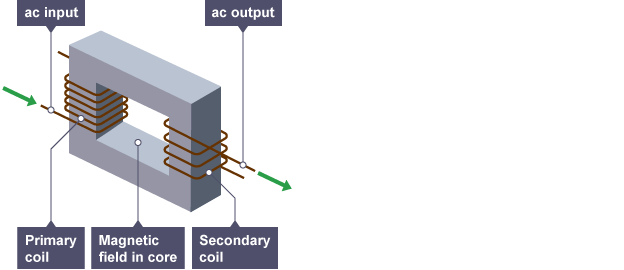
how does a transformer work?
when an alternating voltage is applied across the primary coil, the iron core magnetises and demagnetises quickly
this causes a changing magnetic field in the iron core and across the secondary coil
this induces a voltage in the secondary coil (more turns = more voltage induced)
if connected to a complete circuit, a current is also induced
what equation shows how to calculate input/output voltage/number of turns?

how efficient are transformers?
nearly 100%
what is the relationship between power in and power out in transformers?
power in = power out
how do you calculate the input/output current/voltage of a transformer?
V1I1=V2I2
what is the problem with voltage produced by power stations?
it is too low to be transmitted efficiently
as P=IV this makes the current very high
so lots of heat is lost as current causes wires to heat up
how can transformers be used to make the transmission of mains electricity more efficient?
a step-up transformer is used to increase the voltage before it is transmitted, making the current very low
a step-down transformer is used to reduce the voltage at the end so it’s more useful and safer to use